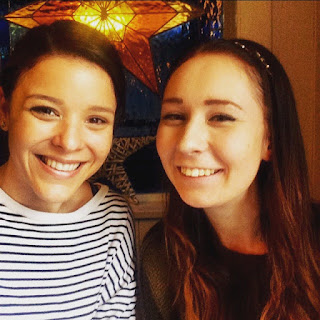I know that I probably sound like a right Scrooge but seriously, sometimes all the fancy lights and special gifts isn't what it's all about.
Back in 2012 I wasn't allowed home, my first (and last hopefully!) Christmas spent in hospital. And to tell you the truth, it was rubbish. The nurses can only do so much; the unit was decorated all festive and on Christmas morning, they even played Christmas music for us but.. there was no escaping the rigid daily routine; breakfast at 8am then shower time at 8:30 and out in my wheelchair for the day ahead. No waking up and coming downstairs in pyjamas and sitting on the floor opening the pile of presents before me. Not being able to see the look on my parents' faces when they unwrapped their present I had thought so carefully about. No turkey dinner. No crackers with bad, cringey jokes inside. No tradition. Nothing was the same.
My family arrived at 10 that morning, bag full of presents for me.
'Happy Christmas Bet!' Oh no, here come the tears...
Before I could attempt to reply, I burst into a crying, snotty mess. They're attempt at being merry only made me realise that they're were trying to cover up the fact that I was in here. And the fact that I had experienced, what can only be described as, the worst thing to ever happen to me.
Mind you, I had been dressed in the right attire for the occasion:
After 10 minutes of sobbing, I quickly cheered up and set my mind on trying to open the huge pile of presents on my bed, with one hand.
I had just been upgraded to a soft diet only, so in a flask my parents had brought some baby carrots, roast chicken and some gravy (suitably thickened for my still-impaired swallow). Even that small bit of lunch was glorious; way better than what had been served to me from the hospital!
After watching Christmas movies on the TV for the rest of the afternoon, my family left at 9pm. Nurses came and said goodnight but apart from that the unit fell silent. I lay in bed exhausted and fell asleep to the memory of my day.
So you see, I don't feel that Christmas is all about the fancy gifts. As long as you have your health and most importantly, your family, nothing else really matters. I know that sounds cliche but really, that's all I wished I had back in 2012.
New Year was the same; instead of watching the firework display with my parents, I was now tucked up in bed at 8pm feeling sorry for myself.
I had to come to terms with a new, very different version of myself. I was entering 2013 completely different to how I'd imagined; I still wasn't able to walk properly, use my left hand, talk or eat that well. The future scared me and I didn't know what it would have in store...
This will be my last blog post of this year so I'm going to combine this post with new year's as well.
2015 has been a better year than the last three but has still been a mixture of highs and lows. I think I've gotten used to the idea that now, my life will not ever be plain-sailing as I'd want but that's okay. I'm on a journey and I still haven't reached my destination yet. I'm bound to come across some stumbling blocks.
But here's why my 2015 wasn't so bad after all:
If you think your year hasn't gone so well, take some time and look back on what has; there's something I'm sure.
To all my followers/readers of this blog, have a wonderful Christmas and I wish you all the very best for what you want to achieve in the year ahead :) Remember, us stroke survivors are all on a journey, it may be hard at times but you can do it for sure, don't give up until you're where you want to be.
I'll see you all in 2016! :)












